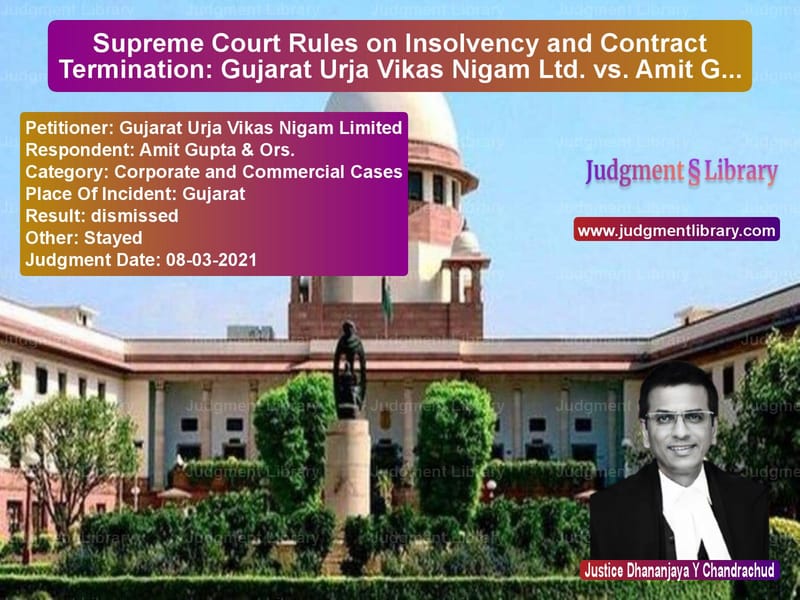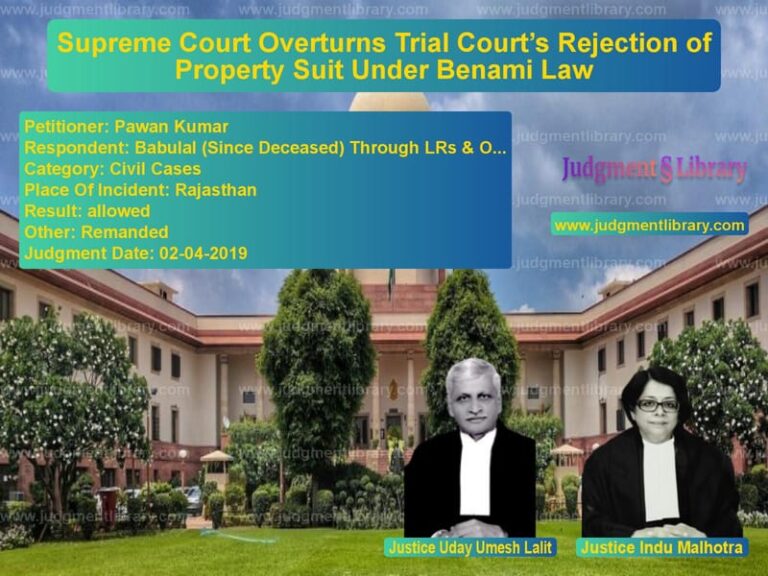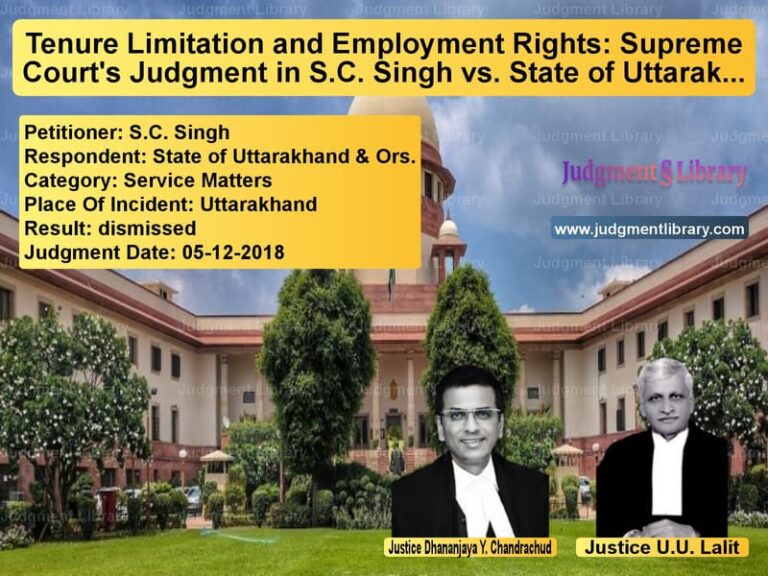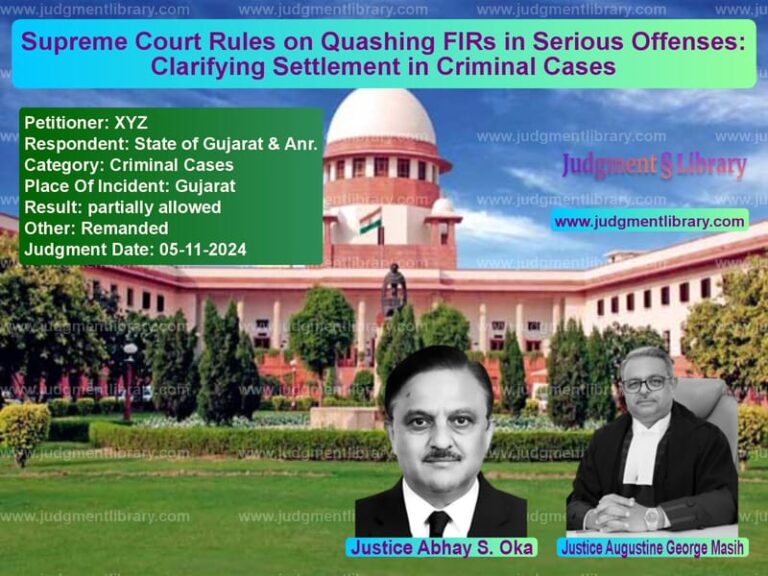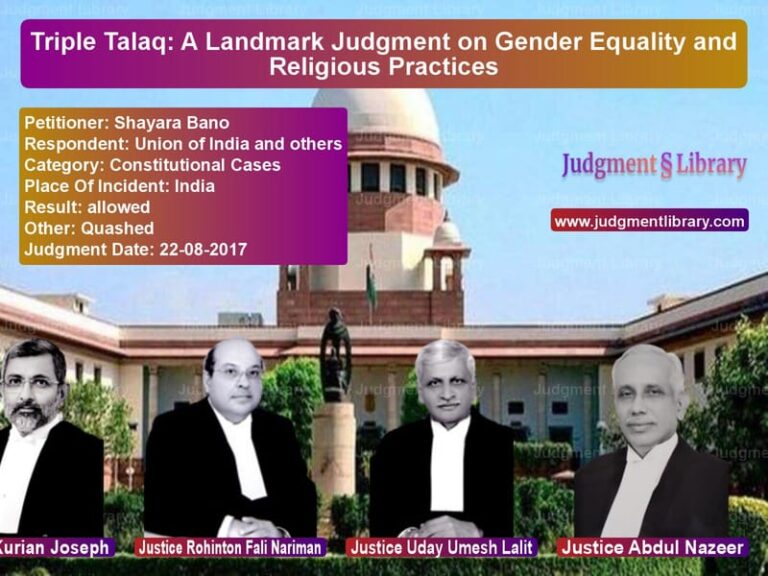Supreme Court Rules on Insolvency and Contract Termination: Gujarat Urja Vikas Nigam Ltd. vs. Amit Gupta
The Supreme Court of India delivered a significant judgment in the case of Gujarat Urja Vikas Nigam Ltd. vs. Amit Gupta & Ors. on March 8, 2021. This case addressed crucial issues concerning the jurisdiction of the National Company Law Tribunal (NCLT) over contractual disputes, the validity of ipso facto clauses in insolvency proceedings, and the impact of termination clauses in Power Purchase Agreements (PPAs) on the corporate insolvency resolution process (CIRP).
Background of the Case
The dispute arose when Gujarat Urja Vikas Nigam Limited (GUVNL) issued a notice of termination for its PPA with Astonfield Solar (Gujarat) Private Limited, citing an event of default due to the commencement of insolvency proceedings against the company. The insolvency process had been initiated under the Insolvency and Bankruptcy Code, 2016 (IBC), and the corporate debtor was undergoing CIRP.
The National Company Law Tribunal (NCLT) stayed the termination of the PPA, a decision which was subsequently upheld by the National Company Law Appellate Tribunal (NCLAT). GUVNL challenged this decision before the Supreme Court, arguing that the NCLT and NCLAT lacked jurisdiction to adjudicate contractual disputes and that it had a valid contractual right to terminate the PPA.
Petitioner’s Arguments
- GUVNL contended that the termination was based on a valid contractual clause and that the NCLT and NCLAT had no jurisdiction to interfere in such matters.
- It was argued that under the Electricity Act, 2003, disputes related to PPAs should be adjudicated by the Gujarat Electricity Regulatory Commission (GERC).
- GUVNL also cited the Supreme Court’s judgment in Embassy Property Developments, which held that NCLT does not have jurisdiction over matters governed by other specialized legislations.
Respondent’s Arguments
- The respondents, including the Resolution Professional (RP) of the corporate debtor, argued that the termination of the PPA would severely impact the CIRP and push the debtor towards liquidation.
- They contended that the termination was solely on account of insolvency, which would be against the objectives of the IBC.
- It was argued that Section 60(5)(c) of the IBC grants the NCLT broad jurisdiction over matters “arising out of” or “in relation to” the insolvency resolution process.
Key Issues Before the Supreme Court
- Whether the NCLT/NCLAT had jurisdiction to adjudicate disputes arising from the termination of a contract like a PPA during insolvency proceedings.
- Whether an ipso facto clause in a contract, which allows termination based on insolvency, is valid under Indian law.
- Whether the termination of the PPA was justified and in line with the provisions of the IBC.
Supreme Court’s Observations
The Supreme Court, while analyzing the case, made the following key observations:
- The NCLT has jurisdiction under Section 60(5)(c) of the IBC to adjudicate matters that directly affect the insolvency process.
- The termination of the PPA was based solely on the initiation of CIRP, which would have led to a loss of value for the corporate debtor.
- The IBC, being a later and more comprehensive legislation, prevails over other laws, including the Electricity Act, 2003, in matters concerning insolvency.
- Ipso facto clauses that allow contract termination solely due to insolvency can be overridden if they undermine the objectives of the IBC.
Supreme Court’s Ruling
The Supreme Court upheld the decisions of the NCLT and NCLAT, stating that the termination of the PPA would frustrate the insolvency process. The Court ruled that:
- The termination of a contract solely based on the insolvency of the debtor is not valid under the IBC.
- The NCLT and NCLAT have the authority to stay such terminations if they affect the insolvency resolution process.
- The continuation of the PPA was essential to ensure the viability of the corporate debtor and to prevent liquidation.
Implications of the Judgment
This landmark ruling clarifies that contracts cannot be arbitrarily terminated on the sole ground of insolvency if such termination hinders the resolution process. It upholds the principle that the IBC aims to maximize the value of assets and ensure that viable businesses are not pushed into liquidation due to contractual technicalities.
Further, this judgment reinforces the jurisdiction of the NCLT in matters related to insolvency and prevents the misuse of termination clauses to frustrate the CIRP. This decision will have significant implications for the energy sector, financial institutions, and all commercial contracts that include ipso facto clauses.
In conclusion, the Supreme Court’s decision in this case strengthens the insolvency framework in India by ensuring that contractual rights are exercised in a manner consistent with the objectives of the IBC. It establishes a crucial precedent in preventing the misuse of contractual provisions that could undermine the insolvency resolution process.
Petitioner Name: Gujarat Urja Vikas Nigam Limited.Respondent Name: Amit Gupta & Ors..Judgment By: Justice Dhananjaya Y Chandrachud.Place Of Incident: Gujarat.Judgment Date: 08-03-2021.
Don’t miss out on the full details! Download the complete judgment in PDF format below and gain valuable insights instantly!
Download Judgment: gujarat-urja-vikas-n-vs-amit-gupta-&-ors.-supreme-court-of-india-judgment-dated-08-03-2021.pdf
Directly Download Judgment: Directly download this Judgment
See all petitions in Bankruptcy and Insolvency
See all petitions in Corporate Governance
See all petitions in Contract Disputes
See all petitions in Judgment by Dhananjaya Y Chandrachud
See all petitions in dismissed
See all petitions in Stayed
See all petitions in supreme court of India judgments March 2021
See all petitions in 2021 judgments
See all posts in Corporate and Commercial Cases Category
See all allowed petitions in Corporate and Commercial Cases Category
See all Dismissed petitions in Corporate and Commercial Cases Category
See all partially allowed petitions in Corporate and Commercial Cases Category

